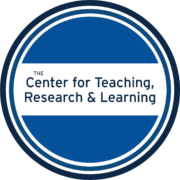Search
The CTRL Teaching & Learning team supports faculty in designing impactful and engaging learning experiences for AU students. As an expert in your field, you bring the “what” to teaching; we’re here to help you with the “how” through evidence-based teaching practices.
If you would like to discuss any aspect of these resources or the teaching of your course, please request a consultation with us. For student-created teaching resources, check out the Student Parter’s Insights. If you have ideas or suggestions for resources that would be useful for you and your department, please reach out to ctrl@american.edu with any recommendations.
How do I design a course?
- Backward Course Design: Alignment of Learning Outcomes, Assessments, and Activities
- Developing Student Learning Outcomes with Bloom’s Taxonomy
- Selecting Course Materials
- Open Education Resources
- Syllabus Guide
How do I structure my class?
- The First Day of Class
- The Last Day of Class
- Structuring an Effective an Effective Class Session or Presentation
- Supporting Effective Group Projects and Teamwork
- Teaching First-Year Students
How do I create accessible and inclusive courses?
- Accessibility Guide
- Accessible Course Design: Universal Design for Learning
- Diversifying Course Materials
- Trauma-Informed Pedagogy
- Identity and Intersectionality in the Classroom
- The Hidden Curriculum: Helping Students Learn the “Secret” Key to Success
How can I design impactful assessments?
What strategies can I use for active learning?
How do I plan and manage classroom discussions?
- Addressing Social Unrest and Traumatic Events
- Utilizing Content Warnings
- Promoting Constructive Dialogue on Contentious Topics
- Facilitating Class Discussions
- Digital Devices in Face to Face Classes
How do I better understand and support my students?
How do I give students effective feedback?
How do I receive and respond to feedback in my teaching?
How do I build my professional practice?
- External Teaching-Related Professional Development Opportunities
- Scholarship of Teaching and Learning
- Zotero Library
How do I create a teaching portfolio?
For AU’s Teaching Portfolios, please note that each academic unit has its own expectations and requirements for these materials. We invite you to use the below guides as they are helpful, but we encourage you to first speak with the chair of your teaching unit or refer to your departmental guidelines on how to construct your portfolio.

AU's Center for Teaching, Research & Learning ©
A Unit of the Office of the Provost
American University, Washington, DC
Get in touch!
Address: Hurst 214
Phone: 202-885-2117
Email: ctrl@american.edu
